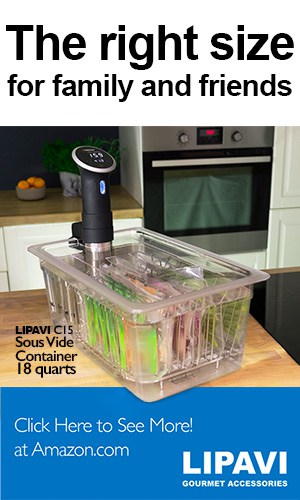-
Sous Vide Time and Temperatures
Sous Vide Time and Temps
Sous Vide Time and Temps
Sous Vide Temps
- All Sous Vide Temperatures
- Sous Vide Beef Temperatures
- Sous Vide Chicken Temperatures
- Sous Vide Duck Temperatures
- Sous Vide Fish Temperatures
- Sous Vide Vegetables Temperatures
- Sous Vide Infusions Temperatures
- Sous Vide Lamb Temperatures
- Sous Vide Pork Temperatures
- Sous Vide Shellfish Temperatures
- Sous Vide Turkey Temperatures
- Recipes Recipes Recipes Recipes
- Getting Started Guides Getting Started Guides Getting Started
- Equipment and Tools Equipment and Tools Equipment Equipment and Tools
- More Resources More Resources Resources More Resources
When to Season
In the General Sous Vide Questions Forum
I have some questions about when to salt food when it comes to sous vide, specifically why you would want to season *before* bagging.
It seems like one of the benefits of sous vide is that I could spend Sunday preparing a bevvy of dishes to last the week. Toss all the ingredients I want in a bag, seal, then plop in the water on the day I want to eat it. Or I could even freeze the prepared meal for longer storage.
My concern would be that if I were to salt food on Sunday, that within a few days I'd almost end up curing it (not always desirable). So it seems to make sense to only season after the cooking is complete (which runs counter to what we're taught about more traditional methods). Or am I wrong about the "curing" aspect?
Even with shorter periods between sealing and cooking, why would I pre-season at all? Wouldn't the salt just leach moisture out of the food?
Is there any reason at all I would WANT to pre-season?
Thanks!
It seems like one of the benefits of sous vide is that I could spend Sunday preparing a bevvy of dishes to last the week. Toss all the ingredients I want in a bag, seal, then plop in the water on the day I want to eat it. Or I could even freeze the prepared meal for longer storage.
My concern would be that if I were to salt food on Sunday, that within a few days I'd almost end up curing it (not always desirable). So it seems to make sense to only season after the cooking is complete (which runs counter to what we're taught about more traditional methods). Or am I wrong about the "curing" aspect?
Even with shorter periods between sealing and cooking, why would I pre-season at all? Wouldn't the salt just leach moisture out of the food?
Is there any reason at all I would WANT to pre-season?
Thanks!
By dancole42 on Thursday, January 12, 2012 at 06:46 PM
7 Replies So Far
A very good question dancole42, in general we now recommend salting after you have cooked the food, unless it is cooked right away (or frozen) and cooked for a short amount of time. Here's some more information about salting and sous vide: Sous Vide and Salt.
That said, the difference tends to be not extreme, unless you had heavily salted it and bagged it days ahead of time.
By Jason Logsdon on Thursday, January 12, 2012 at 07:09 PM
I'm not sure that the amount of salt normally used for taste is sufficient to be considered curing unless you like your food really salty. (Personally, I also consider it to be 'salting' rather than 'curing', which I take to mean include nitrites/nitrates, but that's a different issue.) Also when we brine meat we do it to increase the moistness, so I'm not sure where this all leads us.
By TonyB on Thursday, January 12, 2012 at 10:45 PM
The link above addresses both those issues. The Ideas in Food people and French Culinary Institute both found that pre-salting, especially during long cooking times or cook chill would affect the texture and taste. Like I said, it's minor but still something to keep in mind.
By Jason Logsdon on Thursday, January 12, 2012 at 11:06 PM
I salt after cooking, purely for convenience. Hunks of meat come vacuum packed from my butcher, so it's just easy to plonk them straight in the water bath and worry about seasoning later. Works fine.
By Bronwyn on Saturday, April 14, 2012 at 12:37 PM
I have been down this road. Cuts of meat like filet mignon (beef tenderloin) can be salted before sous vide and still be juicy after. But other cuts that arent as tender end up dry when salting before sous vide. What i have found is that pre searing without salt adds a somewhat savory flavor from the char and also keeps the moisture in while it cooks. Ive noticed less liquid loss vs only post searing. So what i suggest is to pre sear and post sear and add your herbs and salt right before plating. Just be careful as to not over cook when you sear.The hotter your skillet is, the less time it takes to get a nice crust and the less it will cook the inside of the meat.
By FeChef on Saturday, April 21, 2012 at 06:17 AM
Like others have done, I have experimented and researched enough to come to a hard decision. I never salt before sealing unless I'll be eating the protein within about 3 hours. Any longer than that, and I consistently get drier meat with a denser texture. I even make all my rubs without salt now, so I can bag a few briskets or baby backs without worrying about it.
I usually add salt after patting the meat dry, right before searing it (and usually also right before eating :-).
I'm not sure if others would agree, but I'm pretty much convinced that most veggies are exempt from this no-pre-salting rule. I haven't noticed any problems with veggie taste or texture, even after months in the freezer.
I usually add salt after patting the meat dry, right before searing it (and usually also right before eating :-).
I'm not sure if others would agree, but I'm pretty much convinced that most veggies are exempt from this no-pre-salting rule. I haven't noticed any problems with veggie taste or texture, even after months in the freezer.
By Blake Ormand on Thursday, September 06, 2012 at 02:36 AM
Here is a little trick for you. Get yourself a slap of salt, say 12" square by 2" thick. Heat it up in the oven or grill outside to about 600F. Sear you meat/seafood/poulty on the salt slap. Wonderful way to sear you SV! The slaps are available from Amazon
By John Biswanger on Friday, September 14, 2012 at 08:34 PM
Reply to this Topic
In order to add a reply to this topic please log in or create an account, it's free and only takes 30 seconds.Like What You've Read?
If so, please join the more than 19,000 people who receive my exclusive newsletter and get a FREE COPY of my printable modernist ingredient cheatsheet.
Just click on the green button below!
Just click on the green button below!
Get Started!
You're Almost Done!
Thanks for signing up! I look forward to sending you recipes, links, and exclusive content and offers that you can't find anywhere else on the site, and I'll send you a free copy of my modernist ingredient cheatsheet too!
Enter your first name and email below, and I'll see you on the inside!
Privacy Policy:
I hate SPAM and promise to keep your email address safe.
I hate SPAM and promise to keep your email address safe.
You're On Your Way to Sous Vide Success!
Thanks for signing up! I look forward to guiding you through the process of discovering sous vide with amazing articles, recipes, and tips and tricks you can use to impress your friends and family by turning out amazing food time and time again!
Enter your first name and email below, and I'll see you on the inside!
Privacy Policy:
I hate SPAM and promise to keep your email address safe.
I hate SPAM and promise to keep your email address safe.













